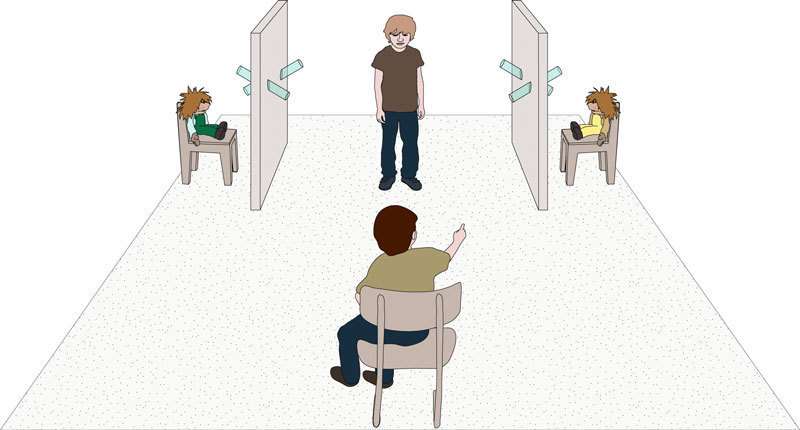“Go play with Anna! Daisy always cheats”: Five-year-olds pass on evaluative information to help another child find a suitable playmate. Credit: MPI f. Evolutionary Anthropology
When it comes to selecting a cooperation partner, information about another person's reputation – for example as a generous person or a miser – may come handy. Many animal species make reputation judgements, but only humans use gossip to pass on evaluative social information about others. Researchers of the Max Planck Institute for Evolutionary Anthropology in Leipzig, Germany, show that five-year-olds but not three-year-olds reliably engage in such prosocial gossip.
Passing on evaluative information about absent others, aka gossiping, may help the recipients of the information to find cooperative partners and avoid uncooperative ones. "So far there has been little scientific evidence for gossiping in children younger than ten years old which we found surprising because preschoolers make reputational judgements in many situations", says Esther Herrmann. The researchers therefore set out to investigate whether three- and five-year-old preschoolers already used prosocial gossip and, to this aim, invited them to play a sharing game.
The set-up of the study included a game consisting of a box of tokens and a set of tubes for sharing these tokens. Three- and five-year-old children played this game twice, each time with a different puppet. The goal of the game was to collect as many tokens as possible during three rounds while giving at least four tokens per round to the "playmate". While one puppet respected this rule, the other puppet always gave only one token, much less than was required. In an alternative setting one puppet always gave seven tokens, much more than required.
Once the child had played three rounds with each puppet, she left the room. In came a second child, roughly of the same age as the first one. Under the pretext that there was not enough time to play the game with both puppets, the experimenter told the second child to choose one of the two puppets as a playmate. The authors of the study then recorded whether the children who had played with both puppets would pass on evaluative information (gossip) about the puppets' past behavior to their peers. "Five-year-old children spontaneously offered information on others' past behavior to help a peer decide on a cooperative partner", says Jan Engelmann. "Three-year-old children also showed a willingness to inform but did so in a non-evaluative manner." In particular, five-year-olds often warned others about the uncooperative behavior of the "greedy puppet" and gave reasons why this puppet should be avoided.
The current results extend previous work on young children's tendency to manage their own reputation by showing that preschoolers also influence others' reputations via gossip. Gossiping about others' past behavior, an often criticized aspect of human sociality, thus starts early in ontogeny.
More information: Jan M. Engelmann et al. Preschoolers affect others' reputations through prosocial gossip, British Journal of Developmental Psychology (2016). DOI: 10.1111/bjdp.12143
Provided by Max Planck Society





















